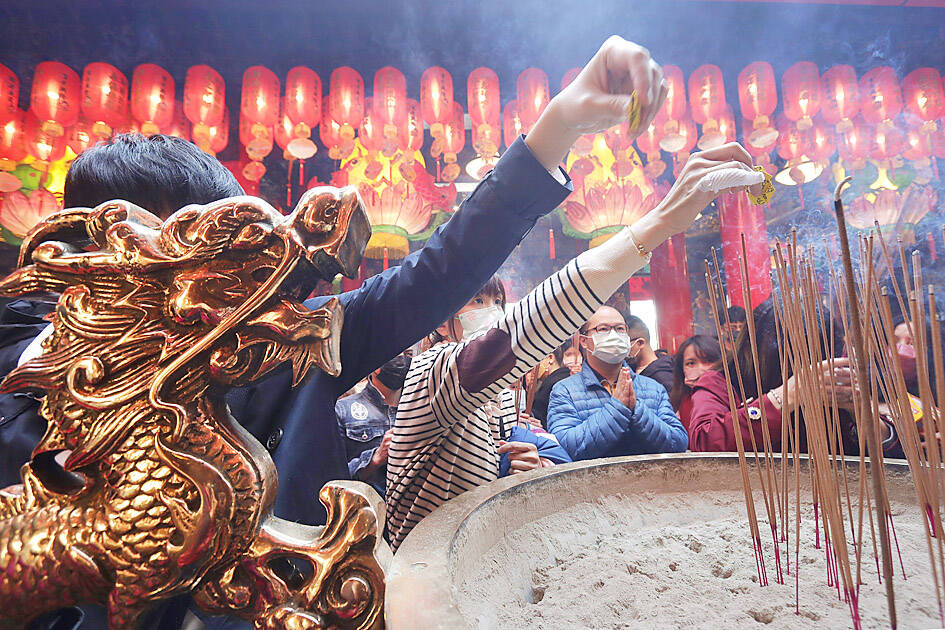China has been seeking to influence Taiwanese elections using its ties with local Matsu (媽祖) temples, academics said yesterday as they shared the results of their research published in Foreign Policy Analysis.
Liu Yu-hsi (劉裕皙), one of the authors of “In the Name of Mazu: The Use of Religion by China to Intervene in Taiwanese Elections,” said the international community has been increasingly aware of Russian and Chinese attempts to intervene in foreign elections through religion.
At a forum hosted by the Democratic Progressive Party, the associate professor at Shih Hsin University said that the Chinese Communist Party has sought to use its agents to influence small and medium-sized enterprises, those with low to middle incomes, and residents in central and southern Taiwan.

Photo: Chiang Ying-ying, AP
Such efforts began targeting local residents and young people in 2017, she said, citing Kaohsiung voting data from 2014, 2016, 2018 and 2020 to show that China had been using Matsu temples as a main channel to exert influence over Taiwanese elections.
Chinese agents use temples to contact members who do not have clear political leanings and seek to influence them through daily communications and by gradually feeding them disinformation, she said.
Boroughs with Matsu temples have been more prone to vote for pro-China leaning political parties in presidential elections — 2016 and 2020 — and estimates show that one temple exerts influence over an average of 925 votes, the research showed.
Not all Matsu temples have been “infiltrated,” and it depended on how they were run, Liu said, adding that if members were stable and did not need to visit China often, then they would not be as affected by China’s “united front” rhetoric.
Temples in rural areas were also less affected, the paper says.
Another author, Sher Chien-yuan (佘健源), a National Sun Yat-sen University associate professor, said that borough wardens believed to have been influenced by China had allegedly mobilized borough residents, resulting in overwhelming support for the Chinese Nationalist Party’s (KMT) anti-ractopamine pork referendum question: “Do you agree that a ban should be in place to prohibit the import of pork and pork products containing ractopamine?”
The article says that in boroughs in Taipei, New Taipei City, Taoyuan, Taichung and Kaohsiung with wardens suspected of having Chinese ties, 4.7 percent more residents voted for the referendum.
Also speaking at the forum about China, Taiwan Sport Forward Association executive director Liu Po-chun (劉柏君), who has a background in religious studies, said that communist parties do not believe in religion.
When China talks about religion, it often harbors ulterior motives, she said.

The US government has signed defense cooperation agreements with Japan and the Philippines to boost the deterrence capabilities of countries in the first island chain, a report by the National Security Bureau (NSB) showed. The main countries on the first island chain include the two nations and Taiwan. The bureau is to present the report at a meeting of the legislature’s Foreign Affairs and National Defense Committee tomorrow. The US military has deployed Typhon missile systems to Japan’s Yamaguchi Prefecture and Zambales province in the Philippines during their joint military exercises. It has also installed NMESIS anti-ship systems in Japan’s Okinawa

‘WIN-WIN’: The Philippines, and central and eastern European countries are important potential drone cooperation partners, Minister of Foreign Affairs Lin Chia-lung said Minister of Foreign Affairs Lin Chia-lung (林佳龍) in an interview published yesterday confirmed that there are joint ventures between Taiwan and Poland in the drone industry. Lin made the remark in an exclusive interview with the Chinese-language Liberty Times (the Taipei Times’ sister paper). The government-backed Taiwan Excellence Drone International Business Opportunities Alliance and the Polish Chamber of Unmanned Systems on Wednesday last week signed a memorandum of understanding in Poland to develop a “non-China” supply chain for drones and work together on key technologies. Asked if Taiwan prioritized Poland among central and eastern European countries in drone collaboration, Lin

BACK TO WORK? Prosecutors said they are considering filing an appeal, while the Hsinchu City Government said it has applied for Ann Kao’s reinstatement as mayor The High Court yesterday found suspended Hsinchu mayor Ann Kao (高虹安) not guilty of embezzling assistant fees, reducing her sentence to six months in prison commutable to a fine from seven years and four months. The verdict acquitted Kao of the corruption charge, but found her guilty of causing a public official to commit document forgery. The High Prosecutors’ Office said it is reviewing the ruling and considering whether to file an appeal. The Taipei District Court in July last year sentenced Kao to seven years and four months in prison, along with a four-year deprivation of civil rights, for contravening the Anti-Corruption

NO CONFIDENCE MOTION? The premier said that being toppled by the legislature for defending the Constitution would be a democratic badge of honor for him Premier Cho Jung-tai (卓榮泰) yesterday announced that the Cabinet would not countersign the amendments to the local revenue-sharing law passed by the Legislative Yuan last month. Cho said the decision not to countersign the amendments to the Act Governing the Allocation of Government Revenues and Expenditures (財政收支劃分法) was made in accordance with the Constitution. “The decision aims to safeguard our Constitution,” he said. The Constitution stipulates the president shall, in accordance with law, promulgate laws and issue mandates with the countersignature of the head of the Executive Yuan, or with the countersignatures of both the head of the Executive Yuan and ministers or